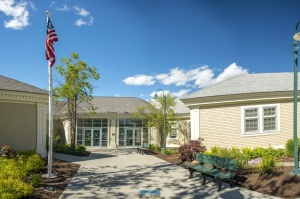A Christian Response to the Humanitarian Crisis in the Mediterranean
Biblical perspective on forced migration
"From the divine banishment of Adam and Eve out of the Garden of Eden (Genesis 3:23,24) to the final book of the Bible penned by John while in exile on the island of Patmos, stories of forced displacement run throughout Scripture. Sometimes the causes are simple and other times complex. Some people were forcibly displaced as a result of their own choices and actions (Adam and Eve, Cain, Moses, etc.), while others were driven from their homes in response to climate change/natural disaster (Noah, Lot), conflict (Hagar, Joseph), famine (Jacob, Abraham, Naomi), war/exile (the nation of Israel, Esther, Nehemiah, Daniel) or persecution (David, Jesus, Philip, Aquila and Priscilla, Peter, the early church)."13
Because the refugee narrative flows from cover to cover through the Bible, we can see that God is often powerfully at work in and through the lives of forcibly displaced people. It is this truth that can help us not become overwhelmed and paralyzed in the face of this present crisis. We need to assume that God is at work along the Refugee Highway. And we need to make ourselves available to God, should he call us to join him.
For a list of many refugees in the Bible, see the related resource available at www.iafr.org/toolbox/articles-handouts.
What is Europe's responsibility regarding the death of so many people?
The Mediterranean has become a giant reflecting pool, exposing the unrelenting evil and despair that is loose in our world. Trace the steps of those on the boats and you will find your way back to wars, failed states, persecution, oppression and hopelessness.
Europe has no choice but to respond to this crisis. There are no easy choices to be made. Nevertheless, we will be responsible for the choices we make.
Perhaps the following European and International voices offer a helpful way forward that is both necessary and realistic.
Value human life above other agendas
During a recent radio interview, Hernan del Valle (Doctors Without Borders), pointed out that "there is only hope if what we're calling for is first and foremost politicians in Europe need to put the lives of human beings above other considerations at the moment."
Embrace solutions that include integration
During the same interview, Mark Micallef (Times of Malta), warned that we need to avoid believing that there is a quick fix to a crisis like this – "…there isn't one. This is a very, very, complex problem that we are going to be facing for the next couple of decades, possibly. The first thing we need to be doing is to stop knee-jerk reactions… This is a very complex problem that needs multidimensional solutions managing the integration of these people in our economies and in our societies."14
Create real alternatives for refugees – and increase burden sharing
The United Nations has welcomed the initial EU response, but challenges the EU to expand measures to include "…developing a robust search-and-rescue operation which places an emphasis on saving thousands of lives; making a firm commitment to receive a significant number of refugees for resettlement in the EU; providing legal alternatives, such as enhanced family reunification, private sponsorship schemes, and work and study visas, so that people in need of international protection do not need to resort to such dangerous voyages; providing support for those countries receiving the most arrivals (Italy and Greece), and; greater intra-EU responsibility sharing to avoid the current situation where a few countries are receiving most asylum-seekers, mainly Germany and Sweden."15
What can local churches do?
Pray
The issues raised in this article offer many points for prayer concerning this crisis. We must pray concerning the root causes of forced migration. We must pray for those who have been forcibly displaced. We must pray for the governments and societies on the front line that have no choice but to respond to the boats in their waters and the people arriving on their shores. We must pray for the church in Europe – that our divine mandate to love the alien and welcome the stranger would demonstrate the love of God in the midst of this humanitarian crisis.
Perhaps God will use Scriptures like the following to help us as we pray.
o Psalm 107:1-8
o Psalm 142
o Psalm 146
o Psalm 5:11
o Matthew 25:34-40
o Exodus 2:15-22
o Acts 8:1-8
o Acts 18:1-4
o 1 Samuel 23:9-16
o Ruth 1:22 and 2:11-13
Get Informed
Many Christians are poorly informed concerning the refugee crisis. Local churches can play an important role in helping their faith communities better understand the realities and challenges related to the crisis. World Evangelical Alliance (WEA) has created a series of user-friendly resources and links to help.
See: www.worldevangelicals.org/refugees for more information.
Network together – The Refugee Highway Partnership
No single government or institution has all that is needed to respond to this crisis. As Christians, we need to work together and encourage one another. The Europe Region of the Refugee Highway Partnership is a network that brings together a wide variety of Christians with a burden to serve refugees. The annual European Roundtable of the RHP is an important opportunity to network together.
Learn more at www.refugeehighway.net/regions/europe.
Raise awareness – Demonstrate solidarity
World Evangelical Alliance (WEA) established World Refugee Sunday as a way for Christians worldwide to demonstrate our common concern for the welfare and protection of forcibly displaced people. The Refugee Highway Partnership (WEA Global Partner) offers many church-friendly resources to help observe this important day of the year.
You can find the resources at: www.refugeehighway.net/resources/world-refugee-sunday.
Hospitality and Integration
As has been mentioned already, the solution to this long-term crisis is going to include creating place within our societies for the wave of people arriving on our shores. Such place is created by welcoming the stranger and helping them integrate into our cities and neighborhoods. What community is better situated for this purpose than a local church?
Governments and social agencies have much needed expertise to provide helpful services to these new arrivals. But they do not offer community or relationship. That is to be a hallmark and strength of a local church.
More church-friendly resources at www.iafr.org/toolbox/articles-handouts.




























